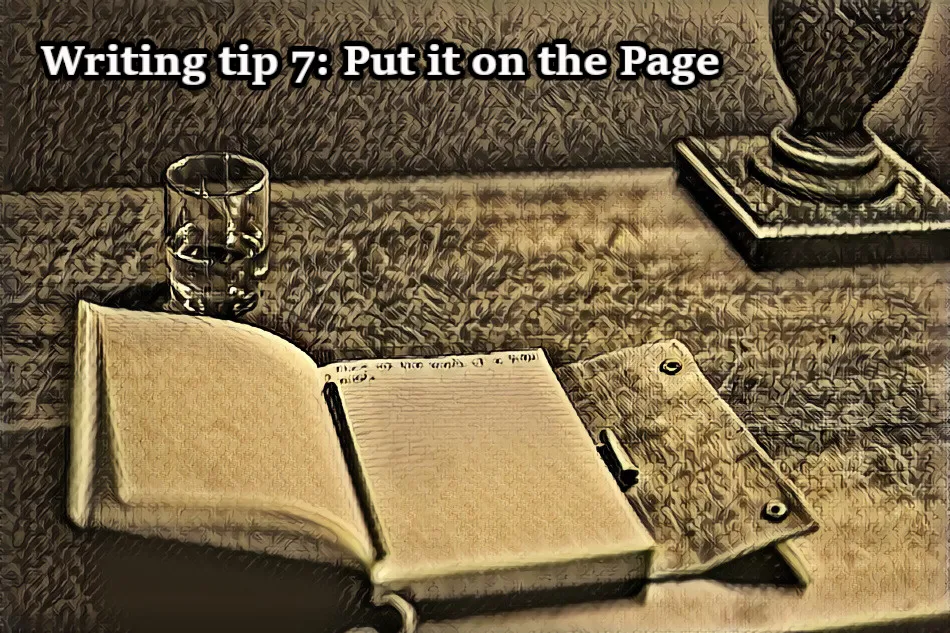
Image by Ichigo121212 from Pixabay, modified using GIMP photo editing Software.
Writing tips can be simple and they can be complex. I try to vary them up in these posts, because they all matter. Not only that, but it can be exhausting dealing with the heavier themes of fiction writing, like plot development.
So today we are going to talk about something so basic that it is deceptively simple: putting words on the page.
Perhaps we all do that naturally here, as we are bloggers. But the brain you bring to blogging is not the same brain you bring to the craft of fiction, am I right?
To blog is to write about anything under the sun - from observations to advice to recipes and photos. It doesn’t have to be beautiful prose, or have a plot or character development. You don’t even need to create a setting or show progression or the resolution of a conflict.
Putting words on the page when they are fictional - made up from nothing - is harder. But let’s talk about making it less so.
Back to basics: Write something
The first step is to write some words. If you haven’t written a lot of fiction, this can be very intimidating. Fiction writers are known for staring at a blank page and not being able to take that first step of writing an opening line, or a bit of description or dialog. This, of course, is called writer’s block.
If you are stuck and looking at a blank page, the absolute worst thing you can do is stay stuck, and keep looking at that blank page, as if words might magically materialize that will one day become the next best selling novel.
Write something.
Write a character’s name and something about him or her. What is bothering him? What is her deepest secret? When you have something on the page, no matter how small, you will discover several amazing and magical things.
This is where the magic begins
The first thing is that you no longer have a blank page. I know, that’s silly, but it had to be said. There is magic in a page having content on it when before it was blank. You made that happen.
The second thing is that you have created someone, and now that person is real in the special universe of fiction.
Let’s say you’ve created a young boy named Barry who has a wart on his thumb and is worried that Jimmy next door is going to steal the robin’s eggs out of the tree that sits between their yards. And maybe Barry very much wants those little eggs to have a chance to hatch and become baby birds. The idea that Jimmy might take them and destroy them is giving him a stomach ache. Whose tree is it, and who gets to say what happens to those eggs?
There - it’s a beginning. Isn’t that amazing? This boy Barry exists nowhere else. He is not of this world. We just made him up, with his wart and his fears, and those things feel real enough that we want him to become even more real. We want to develop his story. This is the magic of fiction writing.
Now you have something to work with. One of the greatest little tips I’ve ever read is “You can’t edit a blank page.”
That means you must have something there. You need to put some words down. Even if they are not beautiful words. Just write them, even if all you can muster is a name and a problem, like someone going to a self-help meeting.
“Hi, my name is Roger and I have a deadly fear of whatever is under my bed.”
“Hi, my name is Petunia, and I have a huge crush on my science teacher.”
“Hi, my name is Ricky and everyone at school hates me because I’m a genius.”
But wait, there’s more magic! The other really great thing that happens when you get that little start is that suddenly, your own imagination is engaged. Maybe you thought your imagination had started to develop rot, because you stared at that blank page and it had no character, no soul, no redeeming qualities.
Then you wrote a few sentences about Barry, or Roger, or Petunia or Ricky, and BAM. The beginnings of a story emerged, ready to be worked with, developed further, and made into something. Now just keep going. You don’t have to know where the story will take you. Your characters will let you know.
Happy writing!
@jayna, writer and moderator at The Ink Well.

If you're looking to up your fiction game and reach that next level, check out my past writing tips linked below.

I would like to invite any lovers of poetry and short stories to visit the hive community started by @raj808 with @stormlight24 called The Ink Well.
Also, with the advent of https://hive.vote/ it is now possible to follow The Ink Well curation trail on Hive blockchain. It works just the same as steemauto; simply navigate to the curation trail section and search for theinkwell (all one word with no @ symbol) and our trail will pop up as an option.
Similarly delegations are possible on Hive using the fantastic https://peakd.com/ Hive Blockchain front end. If you wish to delegate to @theinkwell that supports creative writing on Hive by voting all of our contributors, you can do this from the wallet section of https://peakd.com/


